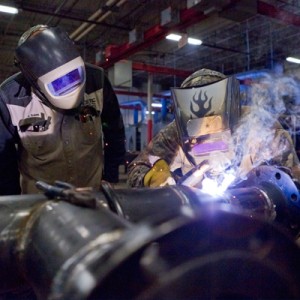An article in the January 7 edition of the Wall Street Journal profiles a TSTC student who turned his two-year welding degree into a $140,000-a-year job working for an energy company in Houston. According to Welding Technology Department Chair Kenny Moore, this is more the norm than the exception these days.
“I think we’re in such good shape because of how the energy sector’s doing right now—it’s booming,” said Moore. “That’s where the majority of our students are being hired; in refineries, chemical plants, offshore oil and natural gas. And for those jobs, Texas is probably the best place to be in the nation.”
And the salaries are eye-popping. Take Guillermo Perez, for example. A May 2014 graduate, Perez was hired by Bechtel Construction before receiving an associate degree. He’s part of the team working with Cheniere Energy to build liquefied natural gas trains and facilities near Corpus Christi.
“I couldn’t be happier,” said Perez. “I had prior experience in the construction trade, but nothing major. Nobody ever gave me the chance that Bechtel did. Now I make $31.50 an hour plus a daily per diem. I work 56-64 hours a week and have my weekends free to spend with my wife and three kids. I don’t need to work more than that to have a great life. We just moved into a new house and bought a brand-new truck. Life is good.”
According to Moore, the key to TSTC’s success in helping graduates find these high-paying jobs is aligning with industry giants and keeping up with the latest technology.
“We’re constantly building the technical side of our curriculum,” Moore explained. “We work hand-in-hand with companies like Bechtel and CRC Evans to make sure what we’re teaching is absolutely cutting-edge and is what industry is looking for when they hire our students. It’s a win for them, too, because they get to hire people that are work-ready from day one. To help us do that, they serve on our advisory boards and donate equipment and funds.”
Evans recently donated $60,000 in brand-new equipment and sent a trainer down to teach faculty and students and to use it, free of charge. And Bechtel, who has hired more TSTC students than any other company, has an office on campus where they offer testing to students about to graduate. These kinds of hands-on relationships are crucial to keeping the Texas economy strong.
“We’re getting a lot of students interested in the program,” said Moore. “They’re enthusiastic and they understand it’s a great market for them right now. We’re continually aligning ourselves with as many companies as we can to give our students the best opportunities to get great paying jobs when they graduate.”
Perez’s advice for anyone considering a welding career: “Definitely keep going beyond the certificate to the associate degree—it really pays off. Before I got mine, I could make maybe $20 an hour, tops. But with the associate you can make more than $30.”
For more information on the TSTC Welding Program, go online at www.tstc.edu/harlingenwelding/
